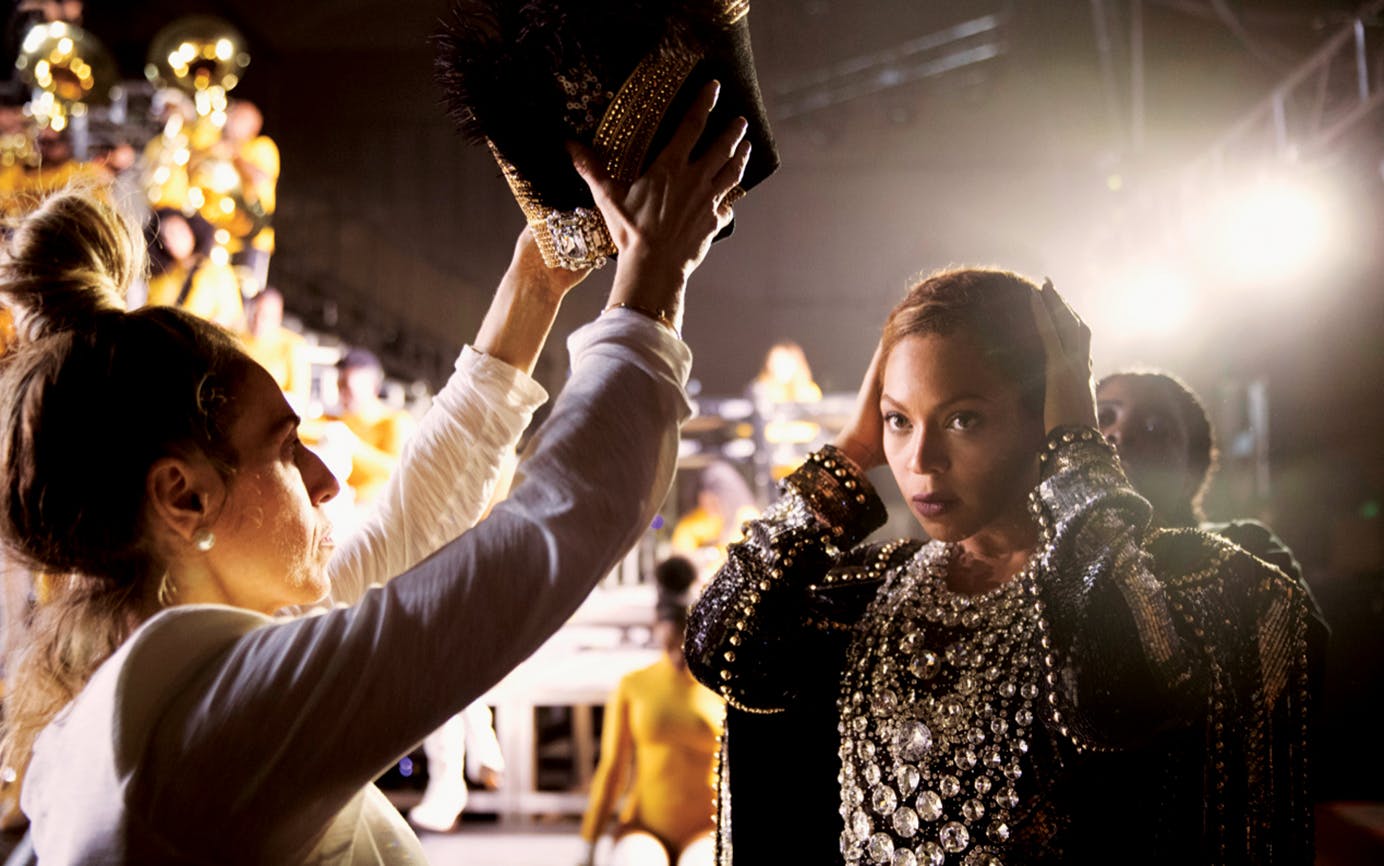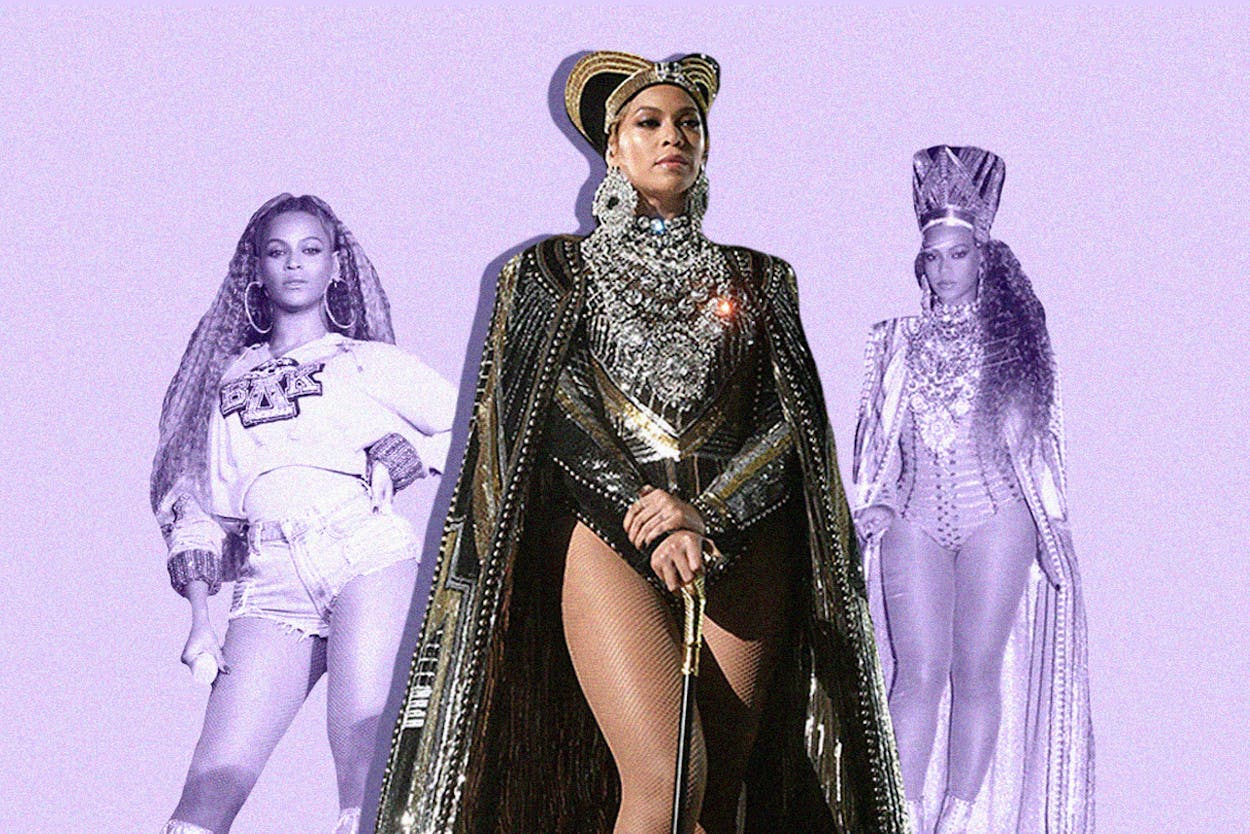When Beyoncé Giselle Knowles-Carter stepped onto the Coachella Valley Music and Arts Festival stage on April 14, 2018, and delivered a groundbreaking performance unlike anything the music festival had ever seen, it wasn’t just another landmark performance for the now 37-year-old Houston native, it was a landmark moment for black culture.
The nearly two-hour performance made me, a Bible Belt-raised, going-to-church-every-Sunday Southern black woman, believe that Beyoncé might in fact be the second coming that my pastor preached about so much from the pulpit. On Wednesday, I once again found myself questioning my religion after Netflix released Homecoming, a documentary directed and produced by the Queen B herself that gives a rare peek into her personal world and creative mind as well as records a historic performance that put blackness front and center on a stage where whiteness had often been the standard. She was the first black woman to headline the festival since it started in 1999.
When Nextflix released the trailer for the documentary last week, I, like the rest of the internet, lost it —and once again realized that Beyoncé will never take her foot off our necks. She’s just that damn good. And as if a directorial debut from Beyoncé wasn’t enough, she also dropped an unannounced live album of her Coachella performance along with the documentary’s debut in the early hours Wednesday, reasserting her role as queen of surprise album drops. Now I can master Beychella’s choreography from the comfort of my own living room.
Beyoncé brought the spirit of homecoming at historically black colleges and universities to Coachella, and a year later, the impact hasn’t worn off on the BeyHive (Beyoncé’s fan following, whom she calls her “ride or dies”). Since last April, every time I’ve opened my “explore” page on Instagram—no, really, every damn day—the BeyHive has continuously uploaded videos of Beychella’s epic choreography and flawless song transitions to relive those moments of artistic greatness that we broke non-Coachella folk didn’t experience unless we watched the live stream.
But in the buzzing world of the BeyHive, it’s all about how hard fans can go for Beyoncé. It’s almost like the group of aunties at a black Baptist church on Easter trying to one-up each other with their outfits and matching hats. On Wednesday, I flexed how much I stan Beyoncé: I threw a screening party, where we sipped cocktails called the “Bey’s Knees” (Beyoncé definitely seems like a gin drinker), pregamed with Beyoncé trivia, and then watched Beyoncé’s vision come to life in arguably one of the most influential music performances not only in Texas music history, but in all of music history.

Like the performance itself, the documentary was a steadfast celebration of black culture. The film not only allowed us to relive her entire performance (my guests and I all sang along to all thirty-plus songs, albeit high-pitched and off-key), but it was bolstered by quotes and voiceovers from black authors like Maya Angelou and Toni Morrison, asserting the power and strength of black art. The film gave us an unfiltered look at how blackness was put front and center—no reservations, no attempts to cater to the whiteness of the festival and its audience—and the artistry that came of that. Throughout the film, Beyoncé spoke about how she took inspiration from HBCUs like Prairie View A&M and Texas Southern University, schools she rehearsed at earlier in her career, and gave us a true HBCU homecoming: a drumline, majorettes, steppers, dancers, and more. Beyoncé was here for the culture—and even if she had to scream it at the top of her lungs, she’d make damn sure you heard it.
The film also took us behind the scenes, offering a deep dive on the stunning visuals, bold costumes, and my personal favorite: the choreography. Preparing for Coachella was an eight-month-long process, and we saw the detail that went into every aspect of the performance. As if Beyoncé couldn’t prove to me enough that God is indeed a woman, just months before she started rehearsing for Coachella, she gave birth to twins after a pregnancy burdened with complications. Although her stamina was awe-dropping, one of the best parts of the film was seeing her vulnerability leading up to the performance and how she handled the pressure to be the performer the world knew her to be as she recovered from her pregnancy. It’s a side of Beyoncé we don’t see often, but it’s also a side of black women in general that we don’t see. Being a strong black woman often forces us to compartmentalize our emotions for the sake of strength. In this film, Beyoncé tells us that it’s okay to be vulnerable—and that there’s strength and celebration in that vulnerability.
Homecoming was an unfiltered, raw expression of her identity, challenging the existing whitewashed structure of not just a hip music festival, but music artistry as a whole. The film provided an overflow of moments that made me proud of what Beyoncé has accomplished in a world where black culture is celebrated only when it’s a trend. Beyoncé has once again let the world know that her dedication, preservation, and creativity are unmatched and that she’ll stop at nothing to make sure people who look like her are celebrated.
“If my country ass can do it, they can do it,” said Beyoncé, in her final line of the film. It’s a damn good Texas proverb to live by—and she made us damn proud to live by it.
- More About:
- Music
- Documentary
- Beyoncé






